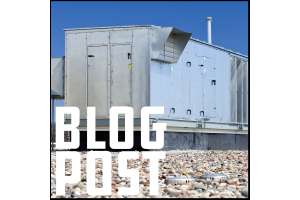

The demand for data centers is skyrocketing as the world becomes increasingly digitalized. These centers are the nerve centers of our digital age, driving everything from cloud computing to AI-driven applications. This sector's growth has been phenomenal, with data center spending expected to surge by 24.1% in 2024, reaching a staggering $293.09 billion. With this rapid expansion, the HVAC industry is experiencing a seismic shift, moving from traditional applications to focus more intently on the specialized needs of data centers.
This article delves into the reasons behind this pivot, explores the challenges and opportunities it presents for HVAC manufacturers, and underscores the critical role of access hardware in ensuring the success of HVAC systems within data centers.
The Driving Forces Behind Data Center Growth
The digital revolution is reshaping industries worldwide, with AI, cloud computing, and the Internet of Things (IoT) leading the charge. Data centers, once mere storage facilities, have evolved into the backbone of modern economies. As AI applications become more sophisticated, they require vast computational resources, leading to increased heat generation and a greater need for efficient cooling systems.
The exponential growth in data center investments is fueled by several factors:
-
- AI and Machine Learning: AI workloads are highly intensive and generate significant heat, requiring advanced cooling systems to maintain optimal performance.
- Cloud Computing: The shift to cloud-based services necessitates more data centers, further driving demand for robust HVAC solutions.
- Global Digitalization: As industries digitize, the demand for data processing and storage increases, pushing the need for more data centers.
HVAC Industry's Response to Data Center Needs
To address the specific challenges of data centers, the HVAC industry is innovating at an unprecedented pace. Traditional HVAC systems, designed for general-purpose cooling, are now being reimagined to meet the unique demands of data centers. The focus is on creating specialized cooling solutions that not only manage heat efficiently but also optimize energy usage—a critical concern for data center operators looking to reduce operational costs and environmental impact.
Emerging Technologies in HVAC for Data Centers
-
- Liquid Cooling Systems: Traditional air-based cooling systems are increasingly being supplemented or replaced by liquid cooling solutions. Liquid cooling is far more effective at managing the intense heat generated by high-density servers, and while its adoption is gradual due to higher costs, it represents the future of data center cooling.
- AI-Driven Climate Control: Leveraging AI, HVAC systems can now optimize energy usage dynamically, adjusting cooling based on real-time data from the data center environment. This not only enhances efficiency but also prolongs the life of the equipment by preventing overheating.
- Sustainable Cooling Solutions: As sustainability becomes a priority, HVAC manufacturers are developing eco-friendly cooling systems that reduce carbon footprints. These systems use advanced refrigerants, renewable energy sources, and heat recovery technologies to minimize environmental impact.
The Critical Role of Access Hardware
While the shift towards specialized cooling solutions is vital, the importance of access hardware in these systems cannot be overstated. Components such as latches, hinges, seals, and locking mechanisms are essential for the reliability, safety, and efficiency of HVAC systems within data centers.
Key Functions of Access Hardware
-
- Reliability and Durability: In the demanding environment of a data center, HVAC systems must operate continuously without failure. High-quality access hardware ensures that systems remain sealed and secure, preventing leaks and maintaining consistent performance.
- Customization and Flexibility: Data centers vary widely in design and requirements. Customizable access hardware allows HVAC systems to be tailored to the specific needs of each facility, ensuring optimal performance across diverse environments.
- Efficiency in Installation and Maintenance: Access hardware that is easy to install and maintain can significantly reduce downtime in data centers. Quick access for maintenance reduces the risk of extended outages, which can be costly for data center operators.
- Safety and Compliance: Data centers must adhere to stringent safety and regulatory standards. Robust access hardware ensures that HVAC systems meet these requirements, protecting both the equipment and the personnel who maintain it.
- Innovation and Technological Advancement: As HVAC systems evolve, so too must the access hardware. Innovations in materials and design allow for better airflow management, improved security, and enhanced overall system performance.
Growth Opportunities for HVAC Manufacturers
The shift toward data centers presents HVAC manufacturers with several significant growth opportunities. By embracing the latest technologies and forming strategic partnerships, manufacturers can position themselves as leaders in this burgeoning market.
Custom Cooling Solutions
As data centers become more specialized, there is a growing demand for custom cooling solutions. HVAC manufacturers that can offer tailored systems designed to meet the specific needs of different data centers will have a competitive advantage. This includes not only the cooling technology itself but also the integration of access hardware that supports these custom solutions.
Long-Term Partnerships
Establishing long-term partnerships with data center operators can provide HVAC manufacturers with a steady stream of business. These partnerships enable manufacturers to refine their products based on real-world feedback, ensuring they meet the evolving needs of the industry. Furthermore, these relationships can foster collaboration on innovations that benefit both parties.
Geographical Expansion
As data centers expand into emerging markets, particularly in regions with lower operational costs, HVAC manufacturers can grow their footprint. Developing adaptable solutions for different climates and regulatory environments can help manufacturers tap into new markets and drive revenue growth.
The Importance of Strategic Access Hardware Partnerships
For HVAC manufacturers entering the data center space, having the right access hardware partner is crucial. A strategic partner can provide not only high-quality components but also comprehensive support services, such as inventory management, lead time reduction, and technical expertise.
Benefits of Strategic Partnerships
-
- Zero Stock-Outs: In the fast-paced world of data center development, having a reliable supply of access hardware components is essential. Strategic partners can ensure that stock-outs are avoided, preventing costly delays.
- Streamlined Operations: Integrated supply chain services provided by access hardware partners can help HVAC manufacturers streamline their operations, reducing costs and improving efficiency.
- Technical and Operational Expertise: Access hardware partners with deep industry knowledge can offer valuable insights that help HVAC manufacturers navigate the complexities of the data center market.
Conclusion
The rapid growth of data centers, driven by advances in AI and digitalization, is reshaping the HVAC industry. Manufacturers are pivoting to develop specialized cooling solutions that meet the unique needs of these facilities. However, success in this market requires more than just advanced technology; it also depends on the reliability, flexibility, and efficiency of the systems' access hardware.
By forming strategic partnerships with access hardware suppliers, HVAC manufacturers can ensure they have the components and support they need to thrive in this dynamic environment. As the data center market continues to expand, those who can adapt and innovate will be well-positioned to capitalize on the opportunities ahead.
For HVAC manufacturers looking to enter or expand their presence in the data center space, the time to act is now. By embracing new technologies, focusing on sustainability, and partnering with the right access hardware suppliers, they can lead the way in this rapidly evolving industry.







